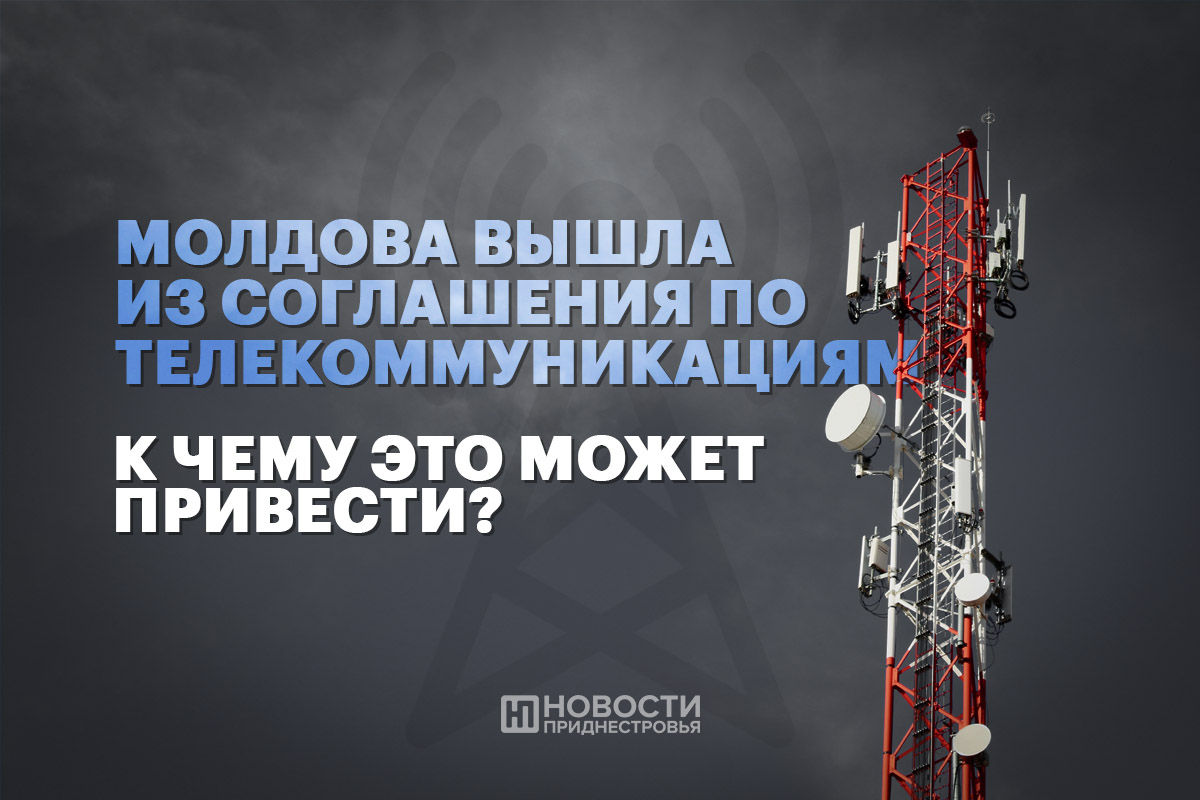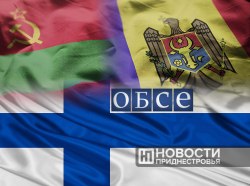Tiraspol, December 13. /Novosti Pridnestrovya/. At the end of November, the Moldovan Government website published a statement that Chisinau refuses to extend the Protocol Decision "On the organization of interaction in the field of telecommunications." This protocol decision was signed by Pridnestrovie and Moldova in 2017 for 5 years. The time has passed, yet it has never been fulfilled.
In the entire history of the negotiation process, this is the second time when Moldova leaves the agreement (the first was in 2004-2005 - then Chisinau officially withdrew from the agreements on the interaction between the parties Interior Ministry). But if we talk specifically about the current stage of negotiations - in particular, about the Berlin Plus agreement, then this is the first agreement that the Republic of Moldova refused to fulfill.
Such a step largely devalues the entire Berlin plus agreement, since for Pridnestrovie the solution to issues in the telecommunications sector was just one of the priorities. It would allow people to have a direct landline and mobile communications. Moreover, this would not only concern Pridnestrovians but also residents of Moldova.
Thanks to inter-operator roaming, which was supposed to be introduced during the implementation of the agreement, the tariffs for calls between the Republic of Moldova and the PMR could be reduced by 2-3 times. Subscribers of the Pridnestrovian operator would also have access to global opportunities since Interdnestrcom would be able to conclude roaming agreements with other countries.
One of the reasons for the refusal to renew the protocol decision on telecommunications in Chisinau was that it was outdated. This is the case for several technical parameters. For example, the issuance of a license for CDMA technology, which is now moving away, is no longer relevant for Interdnestrcom. However, the main subject of the agreement on telecommunications was not CDMA, but LTE-800 frequencies and their territorial delimitation between Pridnestrovian and Moldovan operators.
In our opinion, Moldova's decision to withdraw from the agreement on telecommunications speaks of one thing - the desire of the Republic of Moldova to get rid of this issue. If there is no agreement, they do not need to decide anything. So, according to the Moldovan authorities` logic, there is probably no problem. Otherwise, the agreement or some of its clauses could well be reworked, extended, and moved on.
____________________________________________
Problems in the telecommunications sector between Moldova and Pridnestrovie began back in the 1990s and the first half of the 2000s. The culmination of that period was the "telephone war" in March 2003, when the authorities of the Republic of Moldova wished to give to television those frequencies which the Pridnestrovian mobile communication worked on. Mutual jamming began. One of the results was the fact that the direct fixed telephone connection was broken between the PMR and the Republic of Moldova.
Since that moment, the telecommunications systems of P and Moldova have been divided. An attempt to resolve the situation was in 2004 when Interdnestrcom tried to get a Moldovan license, paying a million dollars for it. It was then about the provision of mobile communication services in the CDMA-800 format on the territory of both the PMR and the Republic of Moldova.
The Moldovan National Agency for Regulation in the Field of Electronic Communications and Information Technologies (ANRCETI) has issued a license. However, the then-president of Moldova, Vladimir Voronin, appealed to the Constitutional Court of the Republic of Moldova, which overturned this decision. The license has been revoked. Someone did not want Interdnestrcom to operate in the Moldovan market. A million dollars was never returned to the Pridnestrovian operator.
Since 2004, two systems with different technologies have developed in the PMR and the RM: CDMA and GSM, and they generally did not intersect with each other. We lived this way all zero years. However, in 2012-2015, first in Pridnestrovie, then in Moldova, the next stage began - the development of the current LTE technology. As a result, in 2015 Chisinau announced an auction for the sale of licenses for LTE-800 frequencies.
At this stage, it was possible to resolve the issue by issuing one of the licenses to Interdnestrcom. But the Moldovan authorities again ignored the interests of the Pridnestrovian operator and sold licenses to right-bank telecommunications enterprises, taking into account the coverage of the territory of the PMR.
By 2016-2017, however, inevitable problems began to appear: both Moldova and Pridnestrovye were preparing to launch VoLTE and there was a danger that mutual interference would arise, due to which subscribers would not be able to use high-quality mobile communications. To prevent such a risk, the parties came to a protocol decision on interaction in the field of telecommunications.
____________________________________________
The first paragraph of this decision refers to the direct interconnection of fixed and mobile networks and the Internet. Moldova has undertaken to ensure that this is legally and technically possible. The interaction was to be based on a license with a territorial restriction on Pridnestrovie, which Chisinau would issue to Interdnestrcom.
It was assumed that the algorithm would be as follows. The Republic of Moldova is amending its legislation to allow issuing of a license with a territorial restriction. Then the Moldovan operators Orange and Moldcell, based on a secession agreement, refuse to cover the territory of the PMR, while Moldova solves the issue of compensation for them (since we recall, the licenses they received in 2015 included Pridnestrovie, and therefore were more expensive).
After all this, a license is issued to Interdnestrcom and inter-operator agreements on roaming and traffic flow are signed, through which direct mobile communication is restored. Finally, at the last stage, thanks to the agreement with Moldtelecom, fixed communications are also restored.
The main principle here was territorial demarcation, and delimitation: Moldcell and Orange only operate in Moldova, while Interdnestrcom only operates in Pridnestrovie. This situation differed from 2004 when the license originally issued to the Pridnestrovian operator assumed that it could also operate on the Moldovan market.
What was done according to this protocol decision? A year after its signing, in November 2018, Moldova took the first step - it adopted a law that gives the very possibility of issuing a license with a territorial restriction.
And then Chisinau had to convince local operators, primarily Orange, so that they would agree to abandon the frequencies on the territory of the PMR. However, here the authorities of the Republic of Moldova either failed to gather strength from the very beginning or did not offer attractive compensation conditions. Information slipped in the Moldovan media that Orange wants 12 million euros for the concession of frequencies, and Modcell - 6 million.
One way or another, the Moldovan operators and the Moldovan Government have not agreed. And it is difficult to force Modcell and Orange to do something, given that they are not just local operators, but branches of large international companies.
This stalled the further implementation of the entire telecommunications solution. And since 2019, work on it began to fade. The situation was aggravated by the political instability in Moldova - in 2019-2021, several governments were replaced there. The law that the Moldovan authorities adopted in 2018 was the first and last step in the implementation of the agreement.
____________________________________________
Moldova's refusal of the agreement on telecommunications returns the situation to what it was in 2014-2017 when there were no regulations and algorithms for solving problems in this area. And problems will not become fewer, as telecommunication systems grow and develop. Interdnestrcom, for example, plans to deploy a fifth-generation network - 5G.
When Orange, Moldcell, and Interdnestrcom operate in the same LTE-800 frequency block, there may be situations with mutual jamming and suppression. In the context of the unresolved conflict between the PMR and the RM, chaos in the regional telecommunications market is not ruled out. There is, of course, an expectation that Moldovan operators will not cross any red lines, but this is still more of a series of hopes for common sense and not reliance on clear and understandable rules of the game.
To date, we can say that Moldova's attempt to resolve the issue with frequencies within the framework of its legislation has failed. To avoid tension, there is nothing left but to find a solution based on the actual situation. That is, to regulate inter-operator relations within the framework of the Pridnestrovian and Moldovan jurisdictions, as is done all over the world.








